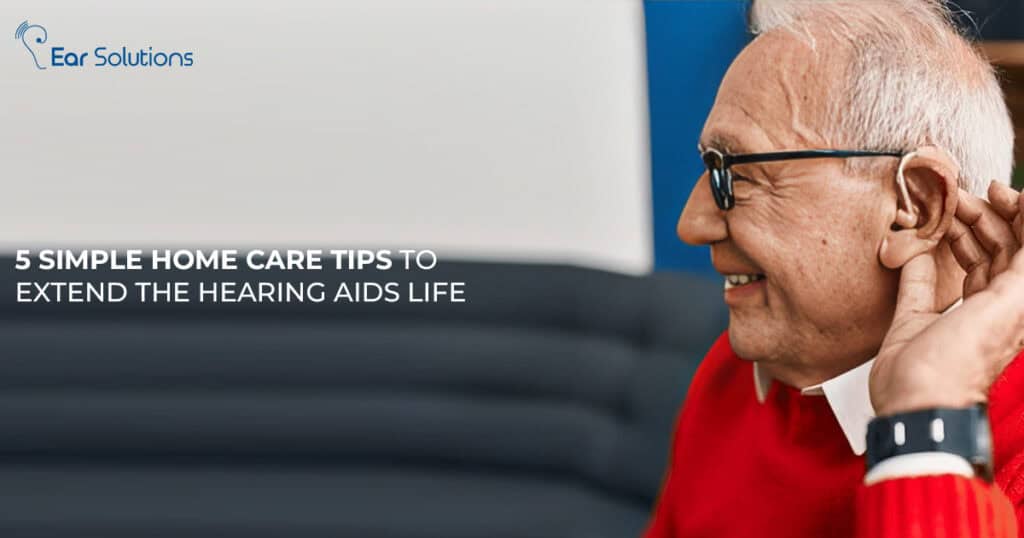Hearing aids are an essential tool for millions of hearing loss patients worldwide, helping them reconnect with their surroundings and improve their quality of life. Looking at the vital role they play, it’s important to take good care of these medical devices to ensure they last as long as possible. While hearing aids are built to be durable and efficient, proper maintenance at home can help in extending their lifespan and ensuring they continue to function at their best. In this blog post, we’ll be discussing about five simple home care tips to extend the hearing aids life.
1. Keep Your Hearing Aids Clean
The first and most common step is regular and proper cleaning of hearing machines. Over time, earwax, moisture, and debris can build up on the device, affecting its performance and sound quality. Cleaning your hearing aids daily helps prevent blockages and keeps them functioning properly.
How to clean your hearing aids:
Use a soft, dry cloth: Wipe the exterior of the hearing machines daily to remove any dirt, wax, or oils.
Use a hearing aid brush: Gently brush the microphone and speaker openings to clear away any accumulated wax or dust. Most hearing aids come with a small cleaning brush, but you can also purchase one separately.
Avoid using water or cleaning chemicals: Hearing aid devices are electronic devices, so avoid exposing them to water or cleaning products that could damage their internal components which will not be covered under insurance. A dry cleaning method is always best.
By cleaning your hearing aids regularly, you can prevent performance issues and ensure they continue to deliver clear, high-quality sound.
2. Store Your Hearing Aids Properly
Proper storage is another key factor in extending the life of your hearing aids. When not in use, hearing aids should be stored in a safe, dry place to protect them from dust, moisture, and accidental damage.
Tips for storing hearing aids:
Use a protective case: Most hearing machines come with a storage case, which offers protection from external elements and reduces the risk of damage. Always store your hearing aids in this case when not in use.
Keep them dry: Moisture is one of the biggest enemies of hearing aids. If your hearing aids are exposed to water or humidity, they could become damaged. To combat this, consider using a hearing aid dehumidifier or drying box. These hearing aid accessories help remove any moisture that may have accumulated throughout the day, especially if you live in a humid climate.
Avoid extreme temperatures: Keep your hearing aids away from direct sunlight, heaters, and freezing temperatures, as extreme heat or cold can damage their internal components.
Proper storage protects your ear machines from environmental damage, ensuring they stay in good working order for years to come.
3. Replace Batteries Regularly or Recharge Properly
The battery is the powerhouse of your hearing device. If your batteries are not properly maintained, it can affect the overall performance of the device. Whether you use disposable batteries or a rechargeable hearing aid, it’s essential to manage them properly to ensure consistent performance.
For disposable batteries:
Turn off your hearing aids when not in use: To extend the life of disposable batteries, always turn your hearing aids off when you’re not using them, especially at night. This helps preserve battery life and ensures the device is fully powered when you need it.
Keep spare batteries on hand: Always carry a spare set of batteries with you, especially if you’re away from home. This way, you can quickly replace the batteries if they run out unexpectedly.
For rechargeable batteries:
Charge nightly: If you have rechargeable hearing aids, make it a habit to charge them every night while you sleep. A full charge will typically last you an entire day, ensuring the device is always ready for use.
Follow charging guidelines: Always use the charger that comes with your hearing aids, and avoid overcharging. Excessive charging can reduce the overall lifespan of the rechargeable battery.
Keeping your batteries in good condition ensures your hearing machines operate smoothly and reduces the risk of sudden power loss.
4. Protect Your Hearing Aids from Moisture
Moisture is one of the leading causes of hearing aid damage. While many modern hearing aids are designed to be water-resistant, prolonged exposure to water, sweat, or humidity can still lead to malfunction. Protecting your hearing aids from moisture is key to extending their life.
How to protect your hearing aids from moisture:
Remove hearing aids during activities involving water: Always take off your hearing aids before showering, swimming, or participating in water sports in case you are using non-waterproof hearing aids.
Dry your ears before inserting hearing aids: Moisture from wet hairs or wet ears can go inside your hearing aids, so make sure your ears are dry before inserting the devices.
Use a hearing aid dehumidifier: As mentioned earlier, placing your hearing aids in a dehumidifier overnight can help remove moisture buildup. This is especially important if you live in a humid climate or sweat heavily throughout the day.
By protecting your hearing aid machines from moisture, you can prevent internal corrosion and other water-related damage, ensuring long-lasting performance.
5. Schedule Regular Check-ups with Your Audiologist
While home care is crucial, professional maintenance and check-ups are equally important for extending the life of your hearing aids. Your audiologist can detect any issues that you may not notice and provide a thorough cleaning or tune-up when needed. You can book a free appointment at Ear Solutions and meet an expert audiologist who can help you overcome different problems that you are facing with your hearing devices.
Why regular check-ups are important:
Professional cleaning: Audiologists have specialized tools to deep-clean your hearing aids, removing any wax buildup or debris that may have been missed during your daily cleaning routine.
Fine-tuning and adjustments: As your hearing needs change, your audiologist can adjust your hearing aids to ensure optimal performance. Regular check-ups help keep your devices calibrated to your specific hearing loss.
Repairs and maintenance: If your hearing aids are experiencing any issues, your audiologist can address them early on before they become major problems.By visiting your audiologist regularly, you can ensure that your hearing aids are functioning at their best and catch any potential problems before they affect your hearing. Also, if there’s a need for changing hearing aids, the audiologist can help you with that as well.
Conclusion:
Taking proper care of your hearing aids at home can significantly extend their lifespan and ensure they continue to provide you with clear, reliable sound. By following these simple home care tips—cleaning regularly, storing them properly, managing batteries, protecting them from moisture, and scheduling check-ups—you can keep your hearing aids in excellent condition for years to come.
Investing time in the care of your hearing aids not only protects your device but also ensures that you get the most out of your hearing experience.

Vishwajeet Vishnu
Managing Director, Ear Solutions
Vishwajeet Vishnu, Managing Director, Ear Solutions, brings over 15 years of experience in the hearing care industry. He is deeply committed to advancing hearing awareness and early diagnosis, and regularly shares practical insights on hearing loss, hearing aids, and emerging industry innovations to support informed decision-making and improved quality of life. As he shared.
At Ear Solutions, We lead with a strong focus on patient-first care, ethical practices, and technology-enabled hearing solutions. I believe in meaningful conversations, authentic connections, and sharing what truly matters from innovation in hearing care to leadership, learning, and personal growth.





